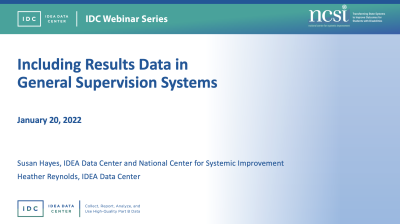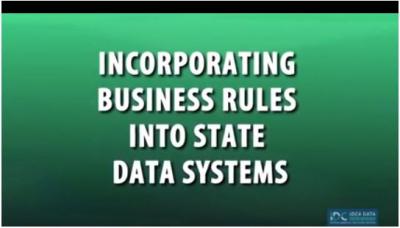Site Search
Results 1 - 7 of 9
-
Including Results Data in General Supervision Systems
This IDEA Data Center (IDC) and National Center for Systemic Improvement (NCSI) joint webinar focused on learning from states that are working to meaningfully include student results or outcomes data in their general supervision systems. Presenters shared “lessons learned” from state work, including both important considerations for states that are in the planning stages, as well as for those actively engaged in centering results data in their accountability and support systems. Participants also heard how states can integrate data use as part of their general supervision system.
This new resource can support SEA staff who prepare for the data systems and SPP/APR components of DMS 2.0. It includes a review of the Parts B and C—Data and SPP/APR Protocol along with IDC’s suggested evidence that an SEA may provide to OSEP in support of each monitoring question in the protocol. This resource also includes a list of IDC TA resources that states can use to create or strengthen their evidence.
Format: Trainings
Incorporating Business Rules Into State Data SystemsThe Incorporating Business Rules Into State Data Systems instructional video explores the different ways Part B and Part C state agencies can incorporate business rules into their IDEA state data collection and reporting systems.
Format: Toolkits
LEA Data Processes ToolkitThere is a continuous need for state education agencies (SEAs) and local education agencies (LEAs) to collect and report comprehensive, high-quality data and ensure they report data accurately and in a timely fashion. The customizable IDC LEA Data Processes Toolkit is a new instrument that can improve decisionmaking about children and youth with disabilities by ensuring data are of high quality and processes are clearly defined and documented, while also providing data staff a map for documenting data processes within local districts.
Format: Quick Reference
Response Rate, Representativeness, and Nonresponse Bias—They All Matter!Response rate and representativeness are important terms in survey work. Consideration of both is necessary to ensure that collected data are valid and generalizable. This resource briefly defines and compares the terms while also explaining how they relate to nonresponse bias.
Format: Toolkits
SEA Data Processes ToolkitUsing the SEA Data Processes Toolkit to document data processes for all 616 and 618 data collections will establish a well-managed process for data collection, validation, and submission. In collaboration with IDC State Liaisons, states can use the toolkit to create and maintain a culture of high-quality data and establish and support consistent practices that produce valid and reliable data, while building the capacity of state staff.
Format: Trainings
The Importance of High-Quality Data and the Role of Business RulesThe Importance of High-Quality Data and the Role of Business Rules instructional video provides a brief introduction to the concept of using business rules to promote and support the collection of high-quality data within state and local systems for IDEA Part B and C.








